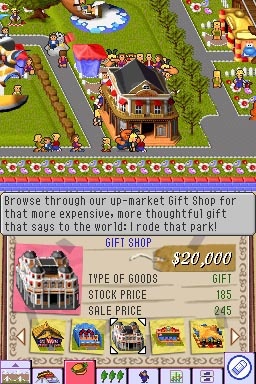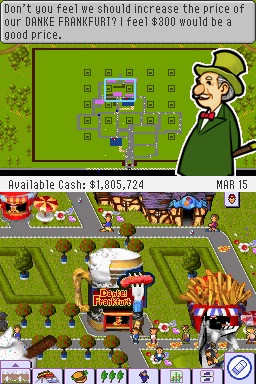If you've ever wondered why anyone listens to the crazy talk of that Peter Molyneux guy, it's partly because of his genre-defining 1994 classic Theme Park for the PC, which opened up the world to business strategy-style games. Echoing the original's gameplay, other versions of Theme Park have attracted new crowds over the years by expanding its vomit-slicked walkways to various consoles and platforms, and the Nintendo DS is the latest venue to proffer the game's exorbitantly priced wares. If nothing less than Cedar Point's direct adrenal stimulation will do, then you might want to stick with the latest Roller Coaster Tycoon game. However, if a nostalgic, cotton-candy-fueled romp through Coney Island sounds like good times, you'll find that Theme Park's original formula is still pretty addictive.

Like most other versions, the DS version of Theme Park offers a very similar experience to the PC original, with slight, mostly superficial, variations. After selecting one of four advisers and choosing a difficulty and sim level for your park, you're let loose in England with a fat wad of cash and a barren field of possibilities. A crash-course tutorial (which is optional but highly advisable) gets you up and running, and then time passes to the periphery as you flesh out your park and gouge your hapless customers for every cent they're worth. Your goal is to increase your park value and available cash to a specified amount, at which time you can choose to sell off your park, expand your empire into new markets, and then start from scratch. It's at this point that the formula breaks down. You can't return to your park once you've sold it off, and though each market you enter into is different, your approach to building up your park from one to the next won't really change, nor will your selection of attractions. So aside from unlocking a small number of new attractions and amenities, there's no particularly compelling reason to take your money and run after painstakingly articulating the park you already have.
But building your park up is the meat of the experience, and for its time, Theme Park could bring even the most stalwart of micromanagers to their knees. From how much salt you put on the fries to how much you pay the man in the rhino suit, you have options. On the most comprehensive level, it's your job to not only plan the layout of the park but also hire staff, stock the warehouse, allocate research funds, and negotiate salaries and supply costs, among other things. Your options are nothing if not numerous, and the pressure of keeping it all under wraps is spiked by the fleeting calendar and the ridiculous demands of your insatiable mob. Plus, you'll definitely run the park into the ground if you place rides and shops haphazardly or fall into any number of other pitfalls for that matter. In fact, until you fully understand the ride-to-shop relationship, you'll probably be utterly baffled when you consistently post year-end losses. However, once you've hit on a winning strategy, that's pretty much it. You simply have to continue with that formula, and the game plays itself out. You'll have a bit more leeway once the park is capable of sustaining itself, and you'll still be at the reins when it comes to how you want the park to look and how to maximize profits. But initially, there's only one clear and decisive way to build your park, once you get down to the nitty-gritty of it.
The DS's dual-screen format lends itself quite nicely to Theme Park's interface. You'll get a rudimentary yet comprehensive overhead view of your park on the top screen, as well as your adviser's tips, your current balance, and the date. The bottom screen displays a close-up view of your park, and the camera distance here feels just about perfect. Clicking on a ride or a staff member brings up detailed information on the top screen while still giving you the zoomed-in look at your park on the bottom screen. To make adjustments, you touch a button on the bottom screen to flip the two screens and then hold the stylus down on whichever indicator is appropriate. The interface as a whole is very clean and uncomplicated, making it a breeze to hike the price of an ice cream cone to $50 and then go plant some shrubbery.
However, the transition wasn't completely smooth. Where you point on the touch screen often doesn't match up to where an object actually is when you're trying to place it. Also, through no fault of your own, guests will occasionally get stuck in line, forcing you first to find them and then erase whatever obstacle is impeding their path. Neither of these bugs is directly detrimental, but you will experience them, and they will probably annoy you. However, what can be detrimental is the placement of coaster tracks and waterslide routes. Unlike walkways and queue lines, these cost money to lay, and you'll occasionally place a few erroneous ones on accident because of the stylus, without possibility of recouping your money. It's also a bummer that you can't tour your park or ride your rides like you could in other versions, and there's only one save slot. It should also be noted that fans who cut their teeth on more recent management games might find aspects of Theme Park too confining, with the most striking examples being that you can't reorient any of your shops or rides to face a direction of your choosing, and personalization and customization options of individual rides range from severely limited to nonexistent.

Even with graphics that are reminiscent of the PC original, the DS version looks quite good. Colors are vibrant, rides and stores are fairly detailed, and patrons, while a bit blocky, exhibit a lot of personality. On a whole, the game has a very clean, uncomplicated look to it that is very inviting. If you're doing well, the game sounds quite nice too. The music is akin to someone jamming on a Casio keyboard (better than you might think), and there are a lot of ambient noises that bring your park to life, such as the ka-ching ka-ching noise of the cash registers. However, if your business turns south, you'll immediately be made aware of it by some persistent and truly grating effects, such as a child that simply won't stop crying no matter how much you beat it with your stylus and retching sounds that capture quite well the aftermath of a weekend-long bender. It would have been nice to tone down or dampen the sound effects a little bit because they are so ubiquitous.
For theme-park-building savants out there looking to flaunt their business acumen, EA Japan has thrown in a local park-sharing feature, which is neat, though online functionality would have been far better. Still, Theme Park is a fairly complex and strategic game that will last as long as you want. You won't find all the bells and whistles adorning more recent management sims, but Theme Park works well in a portable format.